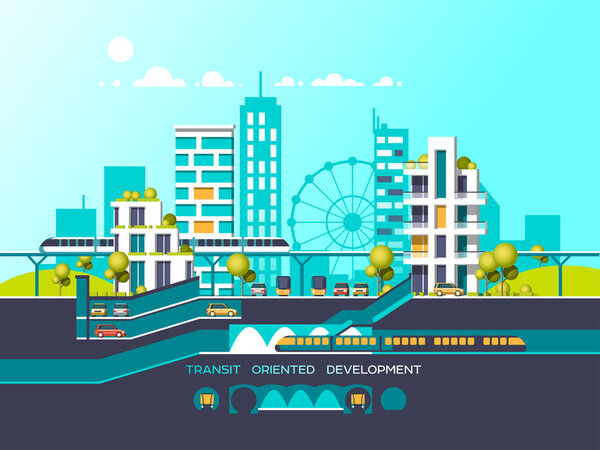
For the first time in human history, most of the world's population lives in cities. Analysts expect, that until 2050 two thirds of the earth´ s inhabitants will live in urban centers. To meet their needs and to make cities all over the world a place worth to be living in, new developments are required. People will need apartments, food and health services, as well as water, energy and sanitation. In order to get to work or school or enjoy other activities like sports and culture, people need to move around in their hometown. To avoid traffic collapses new forms of traffic and transportation are needed.
Sustainable mobility concepts are essential for a modern society, especially with regards to resource and climate protection. The trend towards urbanization is a challenge for cities worldwide, but also offers a lot of opportunities for the future. Future orientated traffic concepts need to integrate a broad variety of functioning, innovative and sustainable transport systems for people and any kind of goods that are needed to keep a modern society running. Cities around the world will have to optimize their transport systems and develop climate-friendly and healthier environments to enhance the quality of life for their inhabitants.
Urban traffic is also an economical issue
In February 2017 the European Road Transport Research Advisory Council (ERTRAC) published its study “Integrated Urban Mobility Roadmap” which offers some major guidelines for future mobility projects. Due to ERTRAC, these projects will have to solve complex issues, including congestion, pollution, access and gridlock. Transport is a key enabler of social and economic development. Within the EU the transport sector is accounting for 9 million jobs. ERTRAC`s analyses show, that 68% of EU- citizens live in urban areas. A high proportion of economic activity takes place in this environment. Therefore problems with urban transport infrastructure can have serious economic consequences for any society. ERTRAC states, road congestion in the EU is often located in and around urban areas and costs nearly €100 billion every year. Urban areas are also particularly exposed to road congestion and higher levels of air and noise pollution.
Though still most Europeans use a car every day, most of the inhabitants support alternative forms of urban transport. The most frequently cited support measures include better public transport and improved walking and cycling facilities. But the public also wants restrictions on the use of certain vehicles such as trucks. Incentives for car sharing and carpooling schemes become more and more popular.
Electric cars are part of modern traffic concepts
Some solutions for modern traffic options have been shown at the 67th IAA in Frankfurt this year. According to the German Association of the Automotive Industry (VDA), visitors of the international car exhibition experienced a broad range of innovations for mobility, from digitization and electric mobility to new mobility concepts in cities. Digitization, and, in particular, electric mobility has been a main topic. “German manufacturers alone have started an offensive for emissions-free and climate-neutral cars for the coming years, with over 150 electric models,” the VDA underscored.
Part of the Frankfurt show has been the New Mobility World (NMW), an additional format for all new players in the world of mobility, the IAA offered this year. Innovators from all sectors, who develop new solutions, technologies or products for the mobility of tomorrow and beyond came together to show their concepts for modern traffic. All in all, 7,000 visitors attended the NMW conferences, which shows the importance of the issue.
Experience and quality are key issues
Modern traffic concepts e.g. autonomous driving need reliable components, as well as experience and the knowledge for market needs. This technical and economic background is mandatory for all kind of vehicles – from cars, to busses and trains or trams. Kontron is a longtime player in this market and highly experienced in various markets such as transportation around the world. Its commercial off the shelf (COTS) and custom products are standards-based and cover a lot of requirements that occur, when OEMs develop traffic solutions that meet their customers special needs. All Kontron solutions offer OEMs from all over the world a broad range of global and local applications in rail, road and shipping traffic demands.
A global market leader for embedded computing technology (ECT), Kontron delivers a broad product series of standards-based transportation computers and custom platforms for rail, road and shipping traffic. One example for its transportation competence is Kontron’s broad range of modern, connected rolling-stock applications through easily customizable, EN50155 certified computer profiles, running on the TRACe product range family. This product family allows OEM customers to use solution ready platforms for transportation in segments like fleet management, train control management systems or passenger information systems as well as entertainment and infotainment.
Kontron has delivered well over 100,000 custom and COTS embedded computers for on-board and way-side applications like vehicle diagnostics, asset tracking, video analytics, fleet management or traffic control and surveillance systems. Kontron's in-depth knowledge of local and international standards and requirements simplifies application development by ensuring validated solutions. Developing, engineering, certifying and manufacturing through a single source guarantee the highest quality and ensure that standards such as ISO9001, EN50155, SIL documentation support etc. are adhered to strictly. Regular audit checks constantly secure the quality of all parts.
Mobility is a system
In February 2017 Gebhard Wulfhorst, Professor of Settlement Structure and Transport Planning at the Technical University of Munich (TUM), spoke about urban mobility concepts of the future at the annual conference of the American Association for the Advancement of Science (AAAS) in Boston. “Munich, Singapore, Boston - three very different cities on three continents, each with its own "urban identity", he said, “nevertheless, they face similar challenges in terms of environmental impact, lack of affordable housing, growing population and traffic chaos.” Like him, most scientists understand mobility as a system, which presently is undergoing major changes - locally and globally. More and more mobility services such as bike sharing are being offered and in a few years' time, autonomous cars could dominate on the roads. “By 2017, half of the world's population is already living in cities, in 2050, two-thirds of humanity is expected to live in urban agglomerations”, the professor states. “How will the new technical possibilities change the cities - and us?”
Municipalities, companies and universities from all over Europe are currently working together to explore ways to ensure that the city of the future is mobile and worth living in at the same time. Due to the scientist, research on new technologies and innovative policy measures can also use the current challenges as a starting point for constructive change adapted to local conditions. In the study "What Cities Want" from 2013, the researchers compared 15 metropolises around the world. The exchange of experts from the various countries with each other made it clear that, despite all the differences, the mechanisms of action are in principle based on comparable principles - in London as well as in São Paulo. The most important prerequisite: politics, public opinion and last but not least business must work together.
What are your experiences? Where do you see the most potential for the further development regarding smart cities?
For more technical details on traffic and smart cities, please see also the blog article by Valentin Scintele:
https://www.kontron.com/blog/mobility/connected-trains
Bild: fotolia © DmiT


{{comment.comment}}